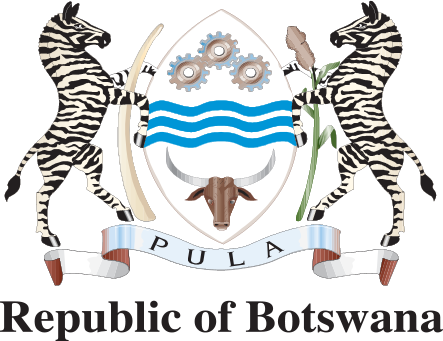The development of the Judiciary is intertwined with the political development of Botswana. The administrative changes that have taken place from the days of colonization to date have also affected the Judiciary and its nature. The functions of the Judiciary are primarily to promote the resolution of disputes in courts and to adjudicated cases within its jurisdiction. By so doing, the judiciary is contributing to the maintenance of peace and tranquility.
The Judiciary is established by the constitution as one of the three arms of Government. Its pivotal role in the governance of the country is defined in the Constitution as the adjudication of both civil and criminal cases involving citizens and the state. It comprises of the Court of Appeal and the High Court and the Magistrates Courts.
Botswana has a dual legal system; that is the received law: Roman Dutch Law existing side by side with Customary Law. This is not dissimilar to other former colonies. During colonial times, Botswana had both foreign inhabitants living side by side with the indigenous people of the country. Each society was governed by legal regime it was familiar with. Foreign colonizers were governed by the received law while the indigenous (Batswana) were regulated under customary law.
The Judiciary is independent from the two other arms of government: the Executive and the Legislature. To further reinforce the independence of the Judiciary and to ensure that it is insulated from interference from the other arms, the constitution demands the existence of the Judicial Service Commission (JSC).
The JSC’s responsibility is the assessment and recommendation of officers to be appointed for Judicial posts and their discipline. Judicial appointments, although made by His Excellency the President, can only be made on the recommendations of an individual by the JSC, with the exception of the appointment of the Chief Justice and the President of the Court of Appeal. The powers and main functions of the Judiciary are defined under Part VI, Section 95 of the Constitution as to hear and determine any civil and criminal cases under any law.
The ultimate goal of an effective and efficient Judiciary is to stop people from taking the law into their own hands and promote an amicable resolution of their disputes. The citizens of Botswana have the right to demand and enjoy the existence of judicial independence.
The Registrar and Master
High Court - Gaborone
Private Bag 00220
Gaborone
Botswana
Tel: (+267) 3718000 / (+267) 3971706
Fax: (+267) 3915119
Website. www.justice.gov.bw
Opening Hours for the office below is between 07:30 to 12:45 and 13:45 to 16:30, Monday to Friday except public holidays.
